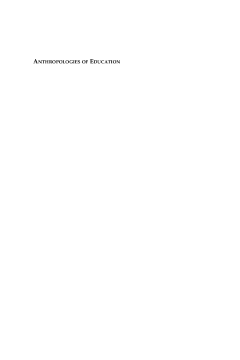
Additional Information
Book Details
Abstract
Despite international congresses and international journals, anthropologies of education differ significantly around the world. Linguistic barriers constrain the flow of ideas, which results in a vast amount of research on educational anthropology that is not published in English or is difficult for international readers to find. This volume responds to the call to attend to educational research outside the United States and to break out of “metropolitan provincialism.” A guide to the anthropologies and ethnographies of learning and schooling published in German, French, Spanish, Portuguese, Italian, Slavic languages, Japanese, and English as a second language, show how scholars in Latin America, Japan, and elsewhere adapt European, American, and other approaches to create new traditions. As the contributors show, educators draw on different foundational research and different theoretical discussions. Thus, this global survey raises new questions and casts a new light on what has become a too-familiar discipline in the United States.
“[The volume’s] importance lies in the fact that it provides a counterweight to what the editor Anderson-Levitt describes as 'hegemonic' English-language ethnographies of education… it is a reminder that, for all the talk of globalisation of social research, there are significant and lively national, regional and linguistic qualitative research communities. These chapter-length accounts introduce the educational debates and issues that matter within such communities... [Another] reason for reading this book is to appreciate the different national histories of qualitative research.” · Qualitative Research
“In this book, authors from non-American contexts have tried to express their own voices and to explore indigenous knowledge about research on anthropology of education. As Sara Delamont puts it in Chapter 2, “The Anthropology of Education is as all-American as Yellowstone Park.… American authors and editors practice routine, casual, unthinking ethnocentrism, which makes all of ‘us’ second-class citizens of ‘their’ global colonialism” (p. 62). With this “global guide of ethnographic studies” in hand, anthropologists and ethnographers in education in the globally different contexts can think and take actions that are different from those of the American routine. It is a voice of the world.” · Frontiers of Education in China
“This ‘global guide’ offers an important invitation for researchers to find inspiration for new lines of inquiry as they learn about practices in other regional and national communities of practice…Education research is a multi-disciplinary field and the collection of essays in this volume draws attention to the contributions anthropologists and ethnographers make to education research through methodologically sound approaches, essential concepts like culture, and critical insights about the role of schooling and educational processes in a multitude of contexts.” · Education Review
“This is an important book, one might almost say a ‘landmark,’ which will fill a big gap in the literature. This volume brings together a rather impressive range of countries, and of authors who are among the very most distinguished ethnographers of education in their countries …There is no truly comparative study of national ethnographic traditions like this.” · Bradley A.U. Levinson, University of Indiana, Bloomington
Kathryn M. Anderson-Levitt is Professor Emerita of Anthropology at the University of Michigan–Dearborn and a former editor of Anthropology and Education Quarterly. She is the author of Teaching Cultures: Knowledge for Teaching First Grade in France and the United States (Hampton 2002) and the editor of Local Meanings, Global Schooling: Anthropology and World Culture Theory (Palgrave Macmillan 2003). She is now Lecturer and Doctoral Advisor, Social Research Methodology Division, at UCLA.
